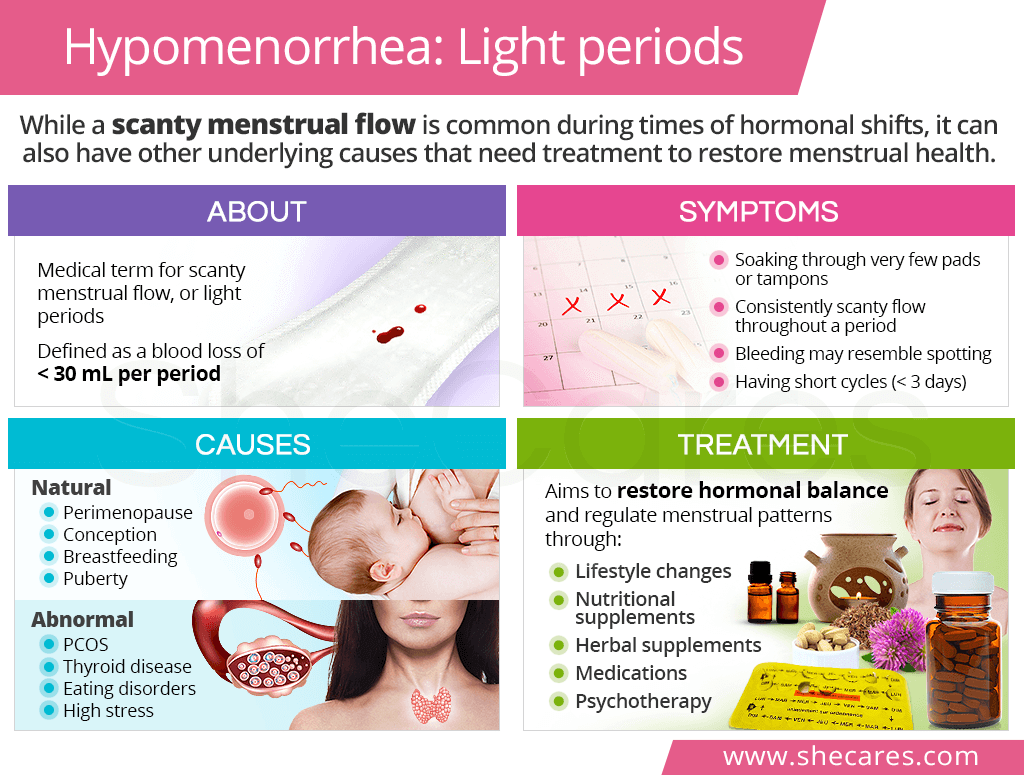What is Hypomenorrhea?
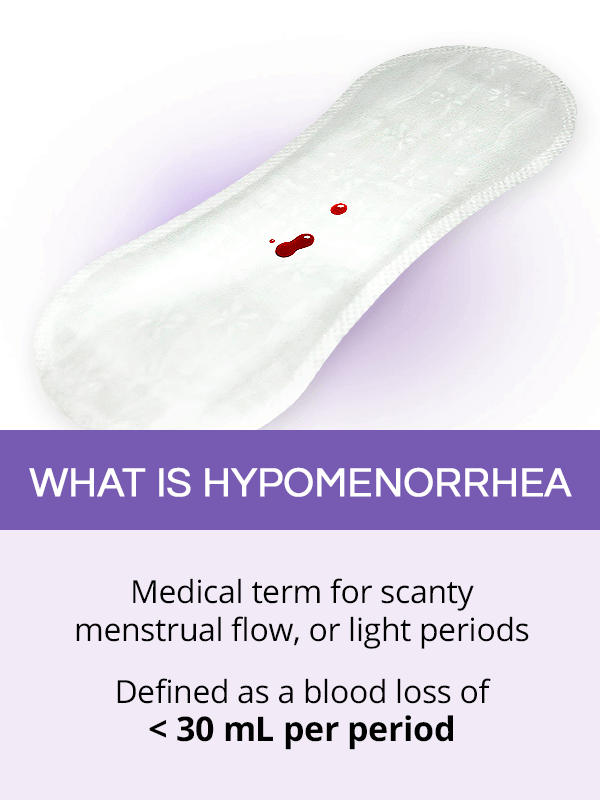
Hypomenorrhea is a medical term for light periods or scanty menstrual flow.
As reference, during a healthy period, a woman will typically lose between 40-60 mL of blood per period, which equals to about three tablespoons.1 Women with hypomenorrhea lose less than 30 mL per cycle.2
Because of scarce amount of bleeding, it may be difficult for women to differentiate light periods from another menstrual disorder, namely spotting between periods. However, it is key to remember that they are two different conditions.
Light Period Symptoms
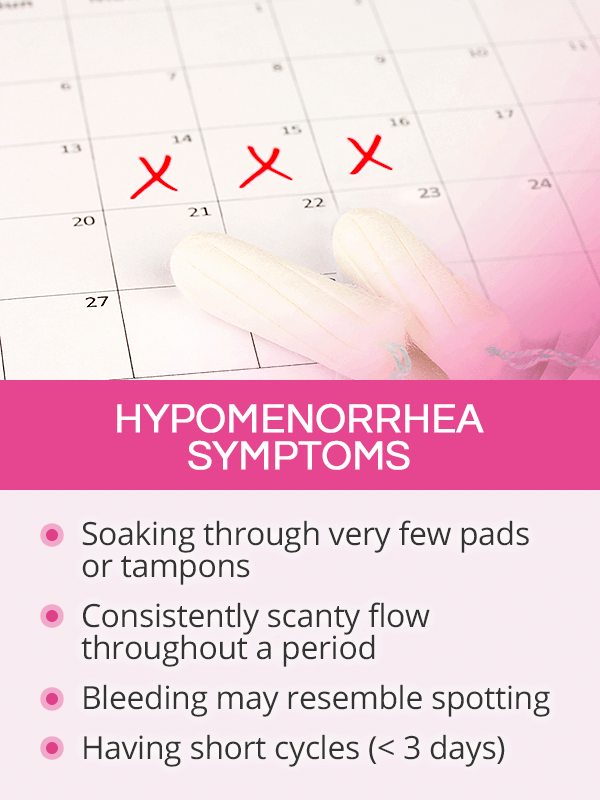
There are no other distinct hypomenorrhea symptoms besides one or several of the following characteristics:
- Soaking through very few pads or tampons
- Having a scanty flow that stays consistently so throughout the period
- Having a period that is shorter than three days
- Bleeding may resemble spotting
Additionally, it is worth keeping in mind that scanty periods are a symptom of an underlying imbalance in the body. As such, they might be accompanied by other cause-specific symptoms, including:
Light Period Causes
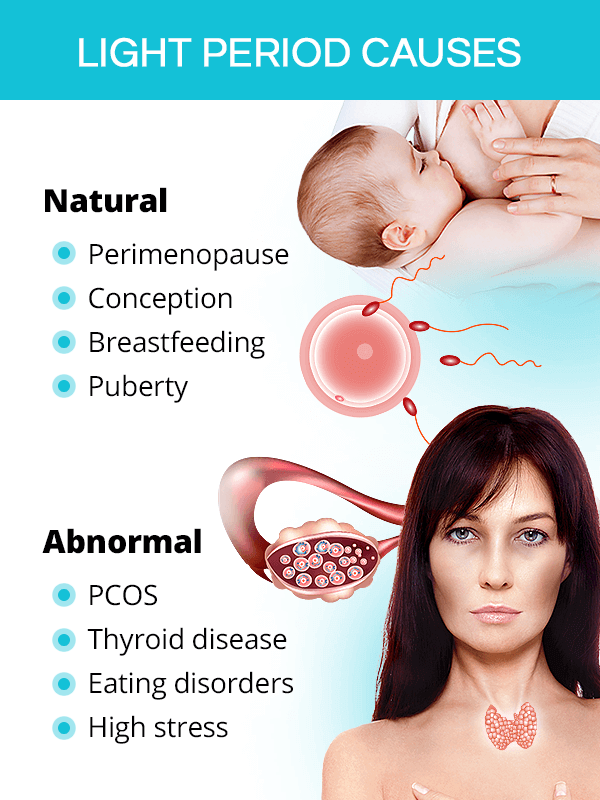
What can cause a very light period is - in most cases - directly or indirectly related to menstrual cyclehormonal Imbalance in the body, which disrupts the menstrual cycle. It can be due to normal and abnormal causes and lifestyle practices.
Normal Causes
Scanty periods are commonly observed during various phases in a woman's life, in which case they do not signal any abnormalities. They include the following:
Perimenopause. As a woman approaches menopause, and her ovaries wind down their hormone production, she will likely experience irregular periods, including a scanty menstrual flow.
Pregnancy. Experiencing bleeding that resembles a light period might also be confused with implantation bleeding, which occurs about seven to ten days after ovulation.
Breastfeeding. It is common for nursing women to have a light menstrual flow when their periods first return following childbirth.
Puberty. The first several periods in a girl's life are likely to be very scanty, often with just light spotting.
Abnormal Causes
Having a light period flow can also result from certain diseases or poor lifestyle habits, including the following:
- Polycystic ovary syndrome (PCOS)
- Thyroid disease
- Insufficient body fat
- Eating disorders
- Strenuous exercise
- Prolonged high stress
- Absence of ovulation (anovulation)
- Birth control pills
- Nutritional anemia
- Asherman's syndrome
Hypomenorrhea Complications
Occasionally lighter periods are generally not a reason to worry, especially when they are present during natural life phases. However, hypomenorrhea due to abnormal causes can have negative consequences on a woman's health.
Infertility
Unresolved PCOS, thyroid disease, high stress, and other conditions behind scanty periods are closely linked to ovulation problems, including its absence, and infertility. As such, women whose periods are light might experience difficulty getting or staying pregnant.
Other Complications
Other complications of having very light periods might arise from the progression of the conditions that cause them in the first place. This may lead to further damage not only to a woman's reproductive health, but also her physical and psychological well-being.
Hypomenorrhea Treatment
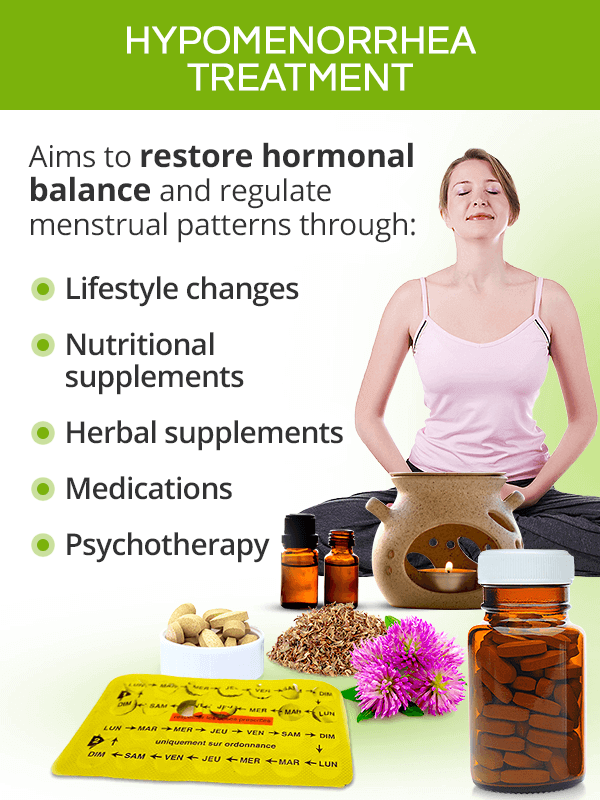
While scanty periods due to normal causes do not require treatment, those caused by diseases or unhealthy habits do have to be properly resolved.
The focus will generally be placed on restoring hormonal balance and regulating menstrual patterns through a variety of approaches.
Lifestyle Adjustments
A balanced diet with phytoestrogen- and iron-rich foods as well as ample supply of protein, healthy fats, and complex carbs
Regular exercise that consists of low- to moderate-intensity workouts for 150 minutes a week
Stress relief in the form of deep breathing exercises, aromatherapy, meditation, or yoga
Alternative Medicine
Nutritional supplements, such as iron, folate, and vitamin B12, to help treat anemia behind hypomenorrhea
Phytoestrogenic supplements, like red clover, to promote hormonal balance by supplying plant-based estrogen
Hormone-regulating supplements, like Macafem, which stimulate the endocrine glands into optimizing their own production of hormones and regulating menstruation
Conventional Medicine
Medications, like birth control pills, might be used to regulate menstrual cycles and normalize period flow
Psychotherapy might be beneficial for women whose scanty periods are due to eating disorders and body image issues
Key Takeaways
Without a doubt, some women's periods are naturally light without the presence of any menstrual abnormalities or other health conditions. However, a woman should not assume that scanty periods, medically known as hypomenorrhea, are natural until she undergoes adequate testing and receives proper diagnosis. While they often occur during times of hormonal fluctuations, such as menopause or puberty, very light periods can also signal underlying medical conditions or unhealthy lifestyle practices that require treatment. Luckily, menstrual health can be achieved with replacing poor habits with wholesome ones, including diet, exercise, and stress relief; taking herbal supplements, like Macafem, to restore hormonal balance naturally; and treating the underlying causes of hypomenorrhea with medications, if necessary.
Sources
- American College of Obstetrician and Gynecologist. (2018). Perimenopausal Bleeding and Bleeding After Menopause. https://www.acog.org/Patients/FAQs/Perimenopausal-Bleeding-and-Bleeding-After-Menopause?IsMobileSet=false
- Cleveland Clinic. (2017). Asherman's Syndrome. Retrieved February 18, 2020 from https://my.clevelandclinic.org/health/diseases/16561-ashermans-syndrome
- Comparative Haematology International. (2001). Secondary Amenorrhoea: Nutritional Anaemia a Cause or Reason. Retrieved February 18, 2020 from https://link.springer.com/article/10.1007/s005800170007
- Eunice Kennedy Shriver National Institute of Child Health and Human Development. (2017). What are the common treatments for menstrual irregularities? Retrieved February 18, 2020 from https://www.nichd.nih.gov/health/topics/menstruation/conditioninfo/treatments
- Office on Women's Health. (2018). Your Menstrual Cycle. Retrieved February 18, 2020 from https://www.womenshealth.gov/menstrual-cycle/your-menstrual-cycle#16
Footnotes:
- InformedHealth.org. (2009). Heavy Periods: Overview. Retrieved February 18, 2020 from https://www.ncbi.nlm.nih.gov/books/NBK279294/
- Clinical Methods. (1990). Abnormal Vaginal Bleeding. Retrieved February 18, 2020 from https://www.ncbi.nlm.nih.gov/books/NBK282/
